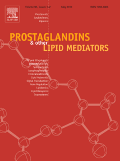
BIOCHIMICA ET BIOPHYSICA ACTA-MOLECULAR AND CELL BIOLOGY OF LIPIDS
Scope & Guideline
Unveiling the Secrets of Lipid Interactions
Introduction
Aims and Scopes
- Lipid Metabolism and Homeostasis:
Research articles often explore the pathways and regulatory mechanisms of lipid metabolism in various organisms, emphasizing the balance of lipids in health and disease. - Lipid-Disease Associations:
The journal frequently publishes studies that investigate the correlation between lipid profiles and diseases such as obesity, diabetes, cardiovascular diseases, and cancer, highlighting the clinical relevance of lipid research. - Lipidomics and Analytical Techniques:
Papers often focus on novel lipidomic techniques and methodologies, enhancing the understanding of lipid composition and dynamics in biological samples. - Molecular Mechanisms of Lipid Action:
The journal covers research on the molecular interactions and signaling pathways involving lipids, including their roles in cell signaling, membrane dynamics, and energy storage. - Role of Lipids in Cell Function:
Research highlights the impact of lipids on cellular processes such as inflammation, apoptosis, and cell differentiation, providing insights into their physiological and pathological roles.
Trending and Emerging
- Lipid Signaling in Inflammation:
There is an increasing focus on the role of lipids in inflammatory processes, particularly how lipid mediators influence immune responses and contribute to chronic diseases. - Metabolomics and Systems Biology Approaches:
Emerging studies are utilizing advanced metabolomics and systems biology techniques to provide comprehensive insights into lipid metabolism and its interactions with other metabolic pathways. - Therapeutic Potential of Lipids:
Research is trending towards exploring the therapeutic applications of lipids, including their roles in drug delivery systems and as potential treatments for various diseases. - Microbiome and Lipid Interactions:
An emerging theme highlights the relationship between the gut microbiome and lipid metabolism, focusing on how microbial communities influence lipid profiles and metabolic health. - Role of Extracellular Vesicles in Lipid Transport:
There is growing interest in the function of extracellular vesicles in lipid transport and signaling, shedding light on their role in intercellular communication and disease progression.
Declining or Waning
- Plant Lipid Metabolism:
Research focusing on lipid metabolism in plant systems has seen a decline, with fewer studies published on plant-specific lipid biosynthesis and function compared to previous years. - Basic Biochemical Pathways:
There has been a noticeable reduction in studies that solely focus on basic lipid biochemical pathways without exploring their implications for health and disease, as the journal's emphasis has shifted towards more applied research. - Historical Perspectives on Lipid Research:
The journal has moved away from publishing historical reviews or perspectives on lipid research, favoring contemporary studies that address current challenges and innovations in lipid biology.
Similar Journals

PROSTAGLANDINS & OTHER LIPID MEDIATORS
Elevating the Study of Lipid Mediators to New HeightsPROSTAGLANDINS & OTHER LIPID MEDIATORS, published by Elsevier Science Inc, is a leading journal dedicated to the advancements in the field of lipid mediators, with a specific focus on prostaglandins and other bioactive lipids. This journal, indexed under ISSN 1098-8823 and E-ISSN 2212-196X, serves as a crucial platform for researchers and professionals to disseminate significant findings that span multiple disciplines, including Biochemistry, Cell Biology, Pharmacology, and Physiology. In the 2023 category quartiles, it has achieved commendable positions such as Q2 in Biochemistry and Q2 in Physiology, underscoring its importance and influence in these domains. Although it is not an open-access journal, it provides robust access options, enhancing the visibility of vital research. With its establishment in 1996, the journal continues its commitment to fostering innovative research until 2024, making it an essential resource for those involved in the dynamic realms of lipid biology and medical research.

BIOCHEMICAL JOURNAL
Illuminating the Path of Molecular DiscoveryBIOCHEMICAL JOURNAL, published by Portland Press Ltd, stands as a leading publication in the fields of Biochemistry, Cell Biology, and Molecular Biology, reflecting a commitment to advancing scientific knowledge since its inception in 1945. With a distinguished Q1 ranking across these categories and impressive Scopus rankings, the journal serves as an invaluable resource for researchers, professionals, and students alike, facilitating critical discoveries and innovative research practices. Although not currently offering open access, the journal provides a platform for high-quality peer-reviewed articles, ensuring rigorous standards in the dissemination of biochemical research. Spanning over seven decades and continuing through to 2024, the BIOCHEMICAL JOURNAL fosters an environment where cutting-edge biochemical research thrives, supporting the global scientific community's efforts to address complex biological questions and enhance our understanding of fundamental cellular processes.

BIOPHYSICAL CHEMISTRY
Innovating research at the crossroads of chemistry and biology.BIOPHYSICAL CHEMISTRY, published by Elsevier, is a prestigious journal with a long-standing tradition since its inception in 1973. This highly respected journal focuses on the intersections of biochemistry, biophysics, and organic chemistry, providing a critical platform for researchers, professionals, and students to disseminate pivotal findings in these dynamic fields. With an impressive impact factor that reflects its robust academic influence and high citation rates, it ranks within the Q2 quartile among its peers in multiple categories, indicating its significance in the scholarly community. The journal, hosted in the Netherlands, encompasses a diverse range of topics, from molecular interactions to protein folding, and serves as an essential resource for those engaged in cutting-edge research. Researchers looking to share their work with a global audience will find BIOPHYSICAL CHEMISTRY an invaluable outlet, fostering the advancement of knowledge in this crucial area of science. For more information, visit the journal's page on the Elsevier platform.

BIOLOGICHESKIE MEMBRANY
Fostering Innovation in Biological ResearchBIOLOGICHESKIE MEMBRANY is a critical journal in the field of Cell Biology and Molecular Biology, published by MEZHDUNARODNAYA KNIGA in the Russian Federation. With an ISSN of 0233-4755, this journal has been serving the academic community since 1996 and continues to publish cutting-edge research that advances our understanding of biological membranes and their functions. Despite being classified in Q4 quartiles for both Cell and Molecular Biology in the 2023 category rankings, the journal presents a unique platform for emerging research within these pivotal areas. Researchers, professionals, and students alike will find valuable insights in its pages as it seeks to foster a collaborative environment that encourages knowledge sharing. Although currently not available as an open-access journal, it remains an essential resource for those looking to deepen their knowledge and contribute to ongoing discussions in the biological sciences. The journal’s commitment to publishing quality research is underscored by its continuous coverage until 2024, making it a sustained reference in the field.

JOURNAL OF CELL SCIENCE
Connecting researchers to the heartbeat of cell science.JOURNAL OF CELL SCIENCE, with ISSN 0021-9533 and E-ISSN 1477-9137, is a distinguished publication in the field of Cell Biology, released by COMPANY BIOLOGISTS LTD in the United Kingdom. Since its inception in 1966, this journal has served as a vital platform for disseminating cutting-edge research and reviews that significantly advance our understanding of cellular processes and innovations. Currently positioned in the Q1 category within the 2023 rankings, this journal is recognized for its high impact and quality, holding a notable Scopus rank of 120 out of 285 in the Cell Biology category, placing it within the 58th percentile. While not an open-access journal, it provides extensive access options for readers and institutions, ensuring that pivotal research is accessible to a wide audience. With converged publication years leading toward 2024, JOURNAL OF CELL SCIENCE continues to be an essential resource for researchers, professionals, and students alike, fostering a deeper understanding of the intricate workings of cell biology.

Nature Metabolism
Advancing metabolic insights for a healthier tomorrow.Nature Metabolism, published by NATURE PORTFOLIO, is a leading journal dedicated to advancing the field of metabolic research and its implications across various biological systems. Since its inception in 2019, this esteemed journal has rapidly established itself as a vital resource for researchers, professionals, and students alike, reflecting its prominence through a prestigious Q1 ranking in several key categories including Cell Biology, Endocrinology, Diabetes and Metabolism, Internal Medicine, and Physiology. With an impressive Scopus ranking, underscoring its impact in Medicine and Biochemistry disciplines, Nature Metabolism offers an exceptional platform for disseminating high-quality research that explores the intricate mechanisms of metabolism and its association with health and disease. Although currently not open access, it continues to gain visibility and appreciation within the scientific community, ensuring that groundbreaking findings reach interested audiences globally from its hub in Berlin, Germany. Whether you are an experienced researcher or an aspiring student, Nature Metabolism serves as an invaluable asset in navigating the complexities of metabolic science.

Algal Research-Biomass Biofuels and Bioproducts
Pioneering research for a greener bioeconomy.Algal Research - Biomass Biofuels and Bioproducts is a prestigious academic journal published by Elsevier, dedicated to advancing the field of algal biotechnology and its applications in biomass, biofuels, and bioproducts. With an ISSN of 2211-9264 and a notable impact factor, this journal is recognized as a leading source of innovative research, boasting a current Scopus rank of #31 out of 406 in the domain of Agricultural and Biological Sciences, specifically Agronomy and Crop Science, positioning it in the top 8% of its field (92nd percentile). This open-access publication, established in 2012 and covering literature up to 2024, prioritizes disseminating high-quality research that fosters sustainable solutions for energy and bioproducts derived from algal resources. As a Q1 ranked journal in the 2023 Agronomy and Crop Science category, it serves as a vital resource for researchers, professionals, and students seeking to understand and leverage the potential of algae within the biodiverse framework of bioeconomy and sustainable practices.

AMERICAN JOURNAL OF PHYSIOLOGY-ENDOCRINOLOGY AND METABOLISM
Driving innovation in diabetes and metabolic research.American Journal of Physiology-Endocrinology and Metabolism, published by the American Physiological Society, stands as a leading platform for disseminating high-quality research in the fields of endocrinology, diabetes, and metabolism, as well as general physiology. With an impressive impact factor placing it within the Q1 category across multiple relevant disciplines (Endocrinology, Diabetes and Metabolism; Physiology; and Medical Physiology), this journal reflects its authoritative position in the scientific community. Spanning from 1980 to 2024, the journal consistently publishes groundbreaking studies and significant findings that advance our understanding of hormonal regulation and metabolic processes. Although it does not currently offer open access, it provides valuable resources for researchers, professionals, and students alike, eager to stay at the forefront of advancements in physiological sciences. Addressed in Rockville, Maryland, its commitment to excellence and rigorous peer review ensures that every article contributes essential insights to the field.

Journal of Clinical Lipidology
Exploring the intricate links between lipids and chronic diseases.Journal of Clinical Lipidology, published by Elsevier Science Inc, is a leading platform dedicated to advancing the understanding of lipidology and its impact on cardiovascular health. With an ISSN of 1933-2874 and E-ISSN 1876-4789, this esteemed journal boasts a remarkable Q1 ranking in key medical categories, including Cardiology and Cardiovascular Medicine, Internal Medicine, and Nutrition and Dietetics, solidifying its position as a vital resource for the latest research and clinical practices. This journal not only serves as a repository for groundbreaking studies but also provides insights into complex interactions between lipid metabolism and chronic diseases, including diabetes and obesity. Researchers, practitioners, and students will find a wealth of carefully vetted articles that drive innovation and improve patient outcomes in lipid management. Although it does not currently offer open access, the Journal of Clinical Lipidology ensures high visibility through rigorous peer review and a commitment to quality, making it an essential read for anyone invested in the future of lipidology.

Cell Division, an esteemed journal published by BMC, serves as a critical platform for researchers in the fields of biochemistry, cell biology, and molecular biology, showcasing groundbreaking studies and novel insights in the mechanisms governing cell division. Since its establishment in 2006, this Open Access journal, based in the United Kingdom, has strived to promote rigorous scientific discourse, ensuring unrestricted access to its rich content. With a commendable impact factor reflected in its Q1 and Q2 categorizations across various biological disciplines, Cell Division is recognized for its influence and relevance in the academic community. Targeting professionals, researchers, and students alike, it aims to disseminate high-quality research findings that further our understanding of cellular processes and contribute to advances in medical and biotechnological applications. Engage with leading-edge research and broaden your knowledge base in cell biology through this dynamic publication that continues to evolve through 2024 and beyond.